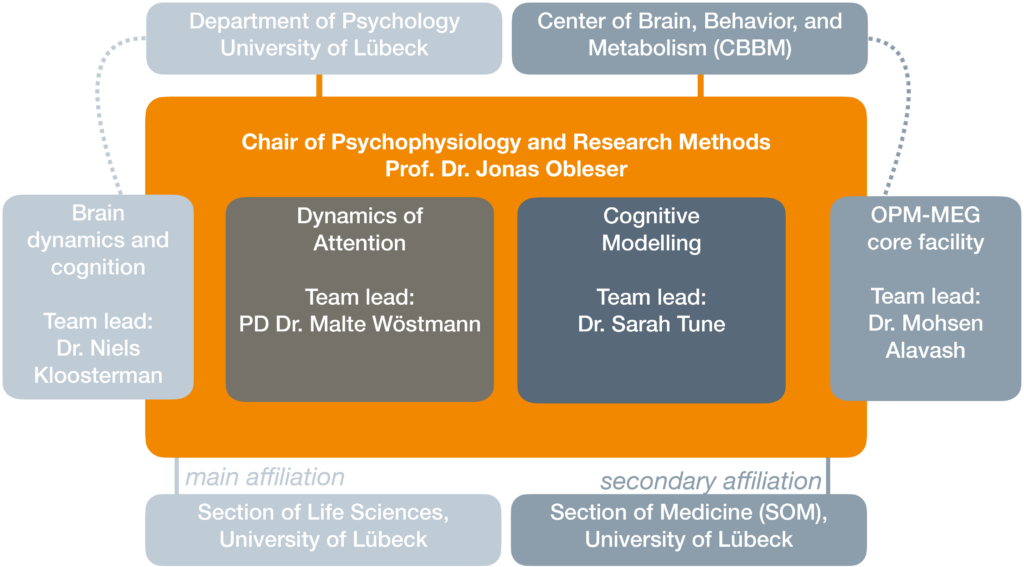Jonas Obleser and the Research Group Auditory Cognition at the University of Lübeck, Germany, study cognitive processes in the human brain.
With our research, we aim to foster a unique cognitive-neuroscience perspective on challenging listening situations, age-related hearing loss, and the psychological and neural mechanisms of successful adaptation to it.
Our methodological focus lies in neural and behavioural dynamics, and we mainly use audition, speech, and language as our “model system”.
As of January 2025, the Obleserlab is structucted as follows:
Current research interests:
Metacognition in speech and listening
— ‘Did I hear this right?’ – this is a question of so-called metacognition, or the ‘knowledge of one’s own cognitive processes’. First, in listening and communication, our own assessment of our perception (‘meta-listening’, almost) shapes our communication behaviour: Is the listening situations deemed too effortful? Do I have the feeling not to understand anything? Second, however, individual perceptual states and traits, such as a tendency to hallucinate or a marked degree of hearing loss, shape the perceptual process itself, the way listeners accumulate sensory evidence and the decisions they derive from these percepts.
Main tools to answer questions of ‘meta-listening’ derive from computational psychiatry and Bayesian models of perception; and we fuse auditory modelling (sensory evidence) with neurophysiological read-outs (pupillometry, EEG, fMRI) and computational models of behaviour.
Contact: Jonas Obleser
Auditory Attention
— How does the neural system implement a listener’s behavioural goal of attending to sound? What are the psychological and neurobiological ‘algorithms’ that we have come to sum under the term of attention?
Main tools are neural oscillations, neural tracking of speech, psychophysics, as well as graph-theoretical descriptions of brain activity in EEG and fMRI
Contact: Jonas Obleser, Malte Wöstmann, Mohsen Alavash
Neural Dynamics and Neural Computations serving Cognition
— Brain activity can be understood as a set of homeostatic and cybernetic processes on many temporal and spatial scales. We ask how excitation/Inhibition (E:I) balance on a local, fast-time scale or network reconfigurations on a more global, medium- and slow-time scale shape the way we sense and perceive the world, and behave in it.
Main tools include quantifications of neural oscillations and scale-free activity, hemodynamic fluctuations, pupillometry; with a focus on mathematical descriptors such as ordinal time-series or graph theory
Contact: Jonas Obleser, Sarah Tune, Mohsen Alavash
Translational Neuroscience in Hearing Loss and Ageing
— All three topics listed above feed into questions of translational neuroscience: Is healthy ageing in and by itself changing the organisation of the listening brain? Is hearing loss a cause or an effect of senescent change in the listening brain? What are the neurobiological, perceptual, and behavioural consequences of aided hearing, including cochlear implants?
Contact: Jonas Obleser , Malte Wöstmann, Sarah Tune
Martin Orf
***
In 2014, Jonas was awarded a European Research Council (ERC) Consolidator grant for studying the adaptive challenges to the middle-aged human adult listening brain (2016–2021). Since 2025, Jonas has been serving as Senior Editor for The Journal of Neuroscience.

